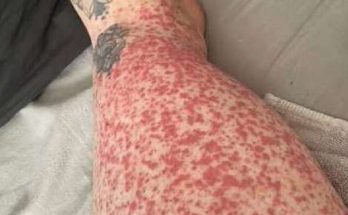⚠️ 1. Unexplained Weight Loss
Shedding pounds without trying? If you lose more than 10 pounds without changes in diet or exercise, it’s time to investigate. Unexpected weight loss can be a sign of several types of cancer, including stomach, lung, or pancreatic.
⚠️ 2. Persistent Fatigue
Everyone feels tired sometimes, but constant, deep fatigue that doesn’t improve with rest could be a red flag. Leukemia and colon or stomach cancers often cause prolonged fatigue.
⚠️ 3. Lumps or Swelling
A new lump or swelling in the breast, testicles, neck, or elsewhere on the body should be evaluated. While not all lumps are cancerous, some can be early indicators.
⚠️ 4. Skin Changes
Watch for new moles, changes in size or color of existing moles, or other skin abnormalities. Skin cancers, especially melanoma, often start with noticeable skin changes.
⚠️ 5. Persistent Pain
Chronic pain that doesn’t go away — especially in the bones, back, or abdomen — could be a symptom of cancers that have spread or are affecting nerves.
⚠️ 6. Changes in Bowel or Bladder Habits
Colon, bladder, and prostate cancers may cause long-term changes in bowel or urinary habits, such as:
-
Diarrhea or constipation lasting more than a few days
-
Blood in stool or urine
-
Increased urgency or frequency
⚠️ 7. Unusual Bleeding or Discharge
Bleeding between menstrual cycles, after menopause, or from the digestive or urinary tract is not normal and needs medical evaluation.
⚠️ 8. Chronic Cough or Hoarseness
A cough that lingers for more than 3 weeks or hoarseness that doesn’t improve can be signs of throat or lung cancer, especially in smokers.
⚠️ 9. Difficulty Swallowing or Indigestion
Ongoing trouble swallowing, pain when swallowing, or persistent indigestion may signal esophageal, throat, or stomach cancer.
⚠️ 10. Sores That Don’t Heal
If you have a sore — in the mouth, on the skin, or elsewhere — that doesn’t heal after several weeks, it could be a sign of cancer and needs attention.
✅ When to Seek Medical Help
If any of these signs persist for more than two weeks, consult a healthcare provider. Early detection is crucial for effective treatment and better outcomes.
🧠 Reminder: These symptoms can also be caused by conditions other than cancer. But it’s always better to check and be safe.
—————–
🛡️ How to Prevent Cancer: 10 Proven Ways to Lower Your Risk
While not all cancers are preventable, up to 50% of cancers can be reduced through healthy lifestyle choices and regular screenings. Here are 10 powerful ways to protect your body and reduce your cancer risk.
✅ 1. Don’t Use Tobacco
Tobacco use is the leading cause of cancer worldwide, linked to cancers of the lung, mouth, throat, pancreas, bladder, and more.
Prevention Tip: Quit smoking or using tobacco products. Avoid secondhand smoke whenever possible.
✅ 2. Eat a Healthy, Balanced Diet
A diet rich in fruits, vegetables, whole grains, and lean proteins can reduce your cancer risk.
-
Limit processed meats and red meat
-
Choose plant-based foods often
-
Avoid sugary drinks and refined carbs
Bonus: A healthy diet also boosts your immune system and energy levels.
✅ 3. Stay Physically Active
Regular exercise helps lower the risk of several cancers, especially breast and colon cancer.
Prevention Tip: Aim for at least 30 minutes of moderate activity (like walking) 5 days a week.
✅ 4. Maintain a Healthy Weight
Being overweight or obese increases the risk of cancers such as breast, colon, uterine, kidney, and pancreatic.
Prevention Tip: Combine diet and exercise to maintain a healthy Body Mass Index (BMI).
✅ 5. Limit Alcohol Intake
Alcohol is linked to mouth, liver, breast, and esophageal cancers.
Prevention Tip: If you drink, do so in moderation — up to 1 drink per day for women, 2 for men.
✅ 6. Protect Your Skin from the Sun
Skin cancer, including melanoma, is one of the most common — but also one of the most preventable.
Prevention Tips:
-
Use broad-spectrum SPF 30+ sunscreen
-
Avoid tanning beds
-
Wear protective clothing and hats
✅ 7. Get Vaccinated
Some cancers are caused by viruses — and vaccines can help protect you.
Essential Cancer-Preventing Vaccines:
-
HPV vaccine (prevents cervical, throat, and other cancers)
-
Hepatitis B vaccine (prevents liver cancer)
✅ 8. Avoid Risky Behaviors
Certain infections and unsafe behaviors can raise your cancer risk.
Prevention Tips:
-
Practice safe sex (to avoid HPV, HIV, and hepatitis)
-
Avoid sharing needles
✅ 9. Get Regular Screenings and Check-ups
Early detection saves lives. Regular screenings can find cancer early or even prevent it.
Common Screenings:
-
Mammograms (breast cancer)
-
Colonoscopy (colon cancer)
-
Pap smears (cervical cancer)
-
PSA test (prostate cancer)
Talk to your doctor about what tests are right for your age and risk level.
✅ 10. Reduce Stress and Prioritize Sleep
Chronic stress and poor sleep can weaken your immune system and indirectly contribute to cancer risk.
Prevention Tip: Get at least 7–8 hours of quality sleep and manage stress with relaxation, meditation, or hobbies.
🌱 Your Health is in Your Hands
You can’t control all risk factors — but by making smart, everyday choices, you can significantly reduce your chances of developing cancer. Prevention is powerful.
🧠 Stay Informed. Stay Protected.
Share this article to help others live a cancer-smart life.



